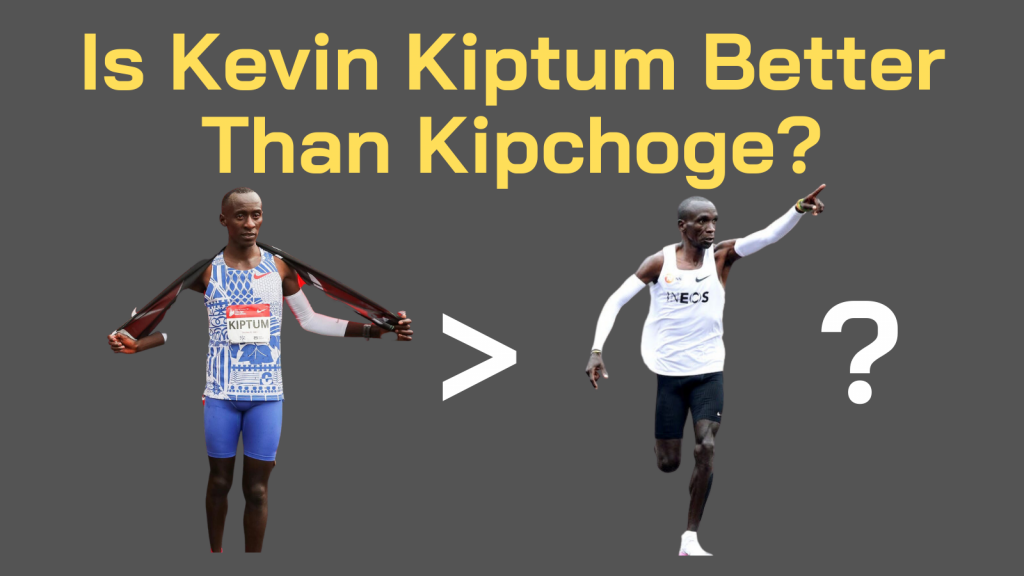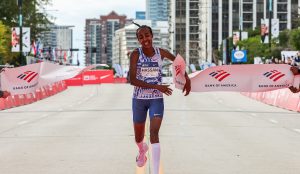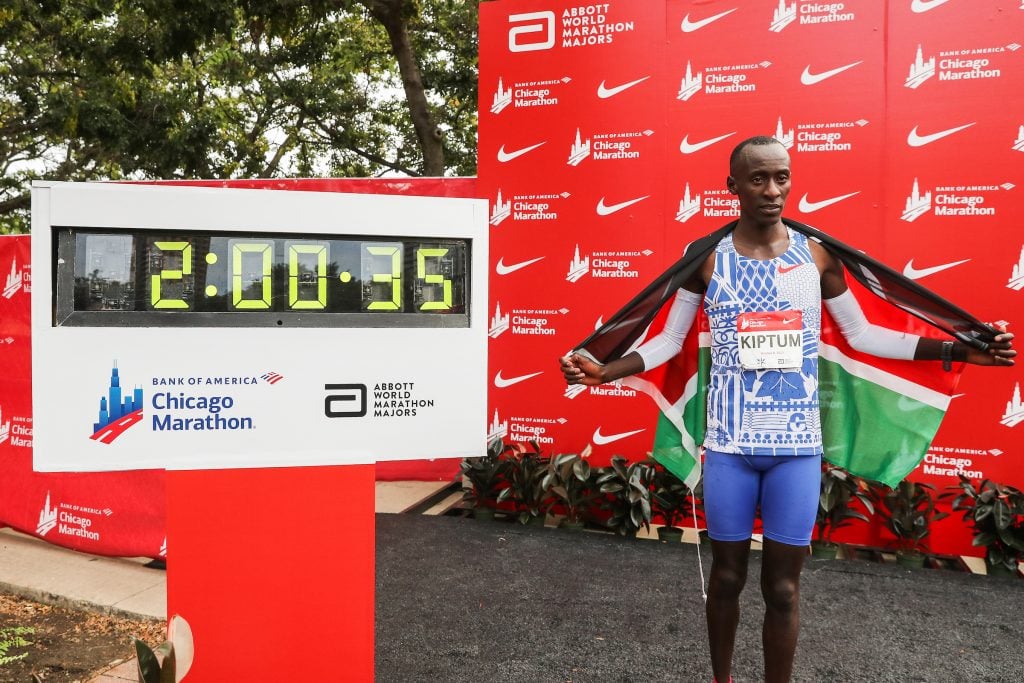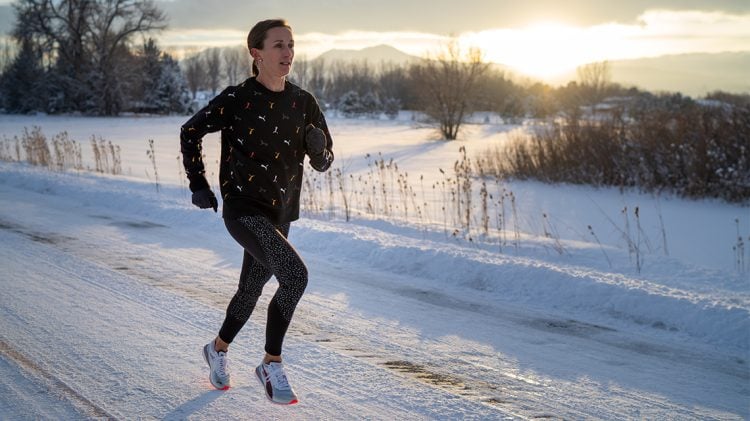WTW: Sorry, Eliud Kipchoge, Kelvin Kiptum Is The Greatest Marathoner On Planet Earth
The Week That Was in Running, October 2-8, 2023
By Robert Johnson****
For Years, It Was Hard To Fathom Someone Could Be Better Than Eliud Kipchoge In The Marathon But That Person Has Arrived
Who is the greatest tennis player in history? If I asked you that question in 2009, the answer would be simple: Roger Federer of Switzerland.
He had won a record 15 Grand Slams. Spain’s Rafael Nadal had won just six and a Serb named Novak Djokovic had won one.
If I asked you that a year later, Federer would still be the answer but Federer fans would have been getting a little bit nervous. In 2010, Nadal won three more Grand Slams (Federer won one) and Nadal’s career record against Federer was an impressive 14-8.
If I asked you now, many people would say Djokovic. He’s won 24 Grand Slams, Nadal has won 22, and Federer 20. Plus he owns the head-to-head matchups against the other two of the Big 3 (30-29 vs. Nadal and 27-27 against Federer. Nadal leads Federer 24 to 16).
In the sport of marathoning, without a doubt the greatest marathoner in history is Eliud Kipchoge. But after what Kelvin Kiptum has done in his first three career marathons, we’re at least in the year 2010 in tennis — we’ve found someone who at their absolute peak is better than the GOAT.
Kelvin Kiptum is without a doubt my #1 marathoner in the world right now.
In less than a year, he’s run a 2:01:53 course record and fastest debut ever in Valencia, a 2:01:25 course record in London, and a 2:00:35 world record in Chicago. Three races, three wins, with an average time of 2:01:17.
Kipchoge’s marathon career also started off incredibly well, with a 2:05:30 win in Hamburg in 2013, a 2:04:05 runner-up in Berlin in 2013, and a 2:05:00 win in Rotterdam in 2014. His average time across those three races was 2:04:51.
Super shoes weren’t a thing back then, so let’s look at how far off the world record the two men were in their first three races. In Kipchoge’s first three races, he was a combined 236 seconds slower than the world record was at the start of each race, or 78.7 seconds off per race. For Kiptum, his three races average out to be a combined 26 seconds over the world record at the start of each race, or just 8.7 seconds per race.
 If margin of victory is what you are into, Kipchoge won his first marathon by 2:05 and his third by 1:08 but neither of those races was an Abbott World Marathon Major (he was defeated by 42 seconds in his second marathon). Kiptum has won his three marathons by 1:07, 2:58, and 3:27 and two of three were official majors (and I’d also count Valencia as a major).
If margin of victory is what you are into, Kipchoge won his first marathon by 2:05 and his third by 1:08 but neither of those races was an Abbott World Marathon Major (he was defeated by 42 seconds in his second marathon). Kiptum has won his three marathons by 1:07, 2:58, and 3:27 and two of three were official majors (and I’d also count Valencia as a major).
And Kiptum is officially only 23 years of age, but if that’s true, then it means he was running half marathons at the age of 13, so we think he might be 26.
Crazy.
###
On this week’s LetsRun Track Talk Podcast, Jonathan Gault argued the better sports analogy is that Kiptum is the equivalent of Patrick Mahomes and Kipchoge is Tom Brady. It’s a great analogy. Brady retired universally regarded as the GOAT but Peak Mahomes seems higher than Peak Brady. Plus Brady, like Kipchoge, enjoyed ridiculous longevity but Mahomes, like Kiptum, could still break all of his records if he sticks around long enough.
###
In terms of running comparisons, Kiptum reminds me of Sammy Wanjiru. When Wanjiru burst on the scene in the late 2000s, we’d never seen anything like it. The marathon was something you moved up to at the end of your career or an event for guys not fast enough for the track. The marathon was an event that had to be respected — the distance was a challenge and there was a fear of hitting the wall.
None of that applied to Wanjiru.
Wanjiru was a prodigious track talent who moved up to the roads almost immediately. He ran a world junior record of 26:41 for 10,000 on the track in August 2005, then ran a world junior record of 59:16 in the half marathon two weeks later.
He made his marathon debut at age 21 at Fukuoka in December 2007, but even in marathon-crazed Japan, where he was based, his coach was trying to get him to be more cautious and not run the Olympic marathon. Wanjiru didn’t listen. He not only ran the 2008 Olympics, he totally revolutionized the marathon event in a single race by throwing caution to the wind and attacking for virtually the entire 26.2-mile distance despite the heat and humidity of Beijing.
The race was so crazy it inspired LetsRun.com coaching guru John Kellogg to write his only race recap in the history of the website. In that recap, Kellogg wrote, “He would stop the clock at 2:06:32, earning Kenya’s first Olympic gold in the marathon and breaking the Olympic record by two minutes and 49 seconds in a performance that prior to the start would have been thought impossible given the weather, the lack of pacesetters and the stakes. This was perhaps the greatest marathon ever run.”
Kiptu’s path is similar to Wanjiru in that he immediately focused on the roads and he’s revolutionized the marathon by how he runs the race.
What’s revolutionary about Kiptum is the way he closes his marathons. Even in the super shoe era, the marathon is supposed to be an event where there is a gradual fade — where the distance gets to you. That doesn’t seem to apply to Kelvin Kiptum. It’s like he’s a video game character who hits turbo at the 13.1-mile mark. A sub-60 second half, which we had never seen before, is now to be expected when he races. Before Kiptum arrived on the scene, the fastest second half in an official marathon was Kipchoge’s 60:33 at 2018 Berlin. In the last 11 months, Kiptum has closed marathons in 60:15, 59:45, and 59:47. Absolutely wild.
- LRC 2008 Olympic Men’s Marathon Recap: Outrageous Pace Pays Off; Wanjiru Hammers to Kenya’s First Marathon Gold
- LRC RIP Sammy Wanjiru: The World’s Greatest Marathoner Has Died
- MB Why are people still clinging to Kipchoge as GOAT?
- MB Molly Seidel: “Who’s the GOAT?’ Who fucking cares? Who’s got the story that’s going to get people excited?”
##
It must be pointed out that a lot of fans think Kiptum’s run is too good to be true.
With uncertainty about his age and changing stories regarding whether he has a coach and who his sponsor is, I get it if you want to question the legitimacy of the actual race. Particularly when you learn that his agent is Marc Corstjens, who has represented a triple crown of EPO cheats that snagged Olympic/World medals in Ruth Jebet, Eunice Kirwa, and Kipyegon Bett.
But if you are a glass-half-empty guy/gal, let me make a glass-half-full argument for you.
Kelvin Kiptum is in his mid-20s and in his athletic prime. If a way-past-his-prime Kenenisa Bekele can run 2:01:41 at age 37, is it that hard to believe that the next generational talent can run just over a minute faster in his prime? Eliud Kipchoge ran his 2:01:09 world record last year at an official age of 37 (many think he is older). How fast do you think he could have run in the marathon if he was running the event in his prime in his mid-20s?
###
Looking ahead to 2024, let’s hope we get to see Kiptum vs. Kipchoge at least once.
It might happen twice — the London Marathon in April and the Olympics in August. But Kiptum’s world record makes it much more likely that Kipchoge runs Boston than if Kiptum hadn’t crushed the world record in Chicago. The Kiptum vs. Kipchoge showdown can certainly wait until the Olympics. It will make it all the more dramatic and it would give Kipchoge the opportunity to erase the one big hole on his CV — no wins in a non-rabbited, non-flat race like Boston or New York. (Kipchoge already has two Olympic golds, but next year’s course in Paris is a beast and much hillier than Rio or Sapporo).
****
Sifan Hassan Runs 2:13:44
 While Kelvin Kiptum’s run was what most blew me away from Chicago, Jonathan Gault said on this week’s LetsRun Track Talk Podcast that he was more impressed by Sifan Hassan‘s 2:13:44 win, given that the #2 time in history was achieved just six weeks after she medaled twice on the track at Worlds, including a bronze in the 1500.
While Kelvin Kiptum’s run was what most blew me away from Chicago, Jonathan Gault said on this week’s LetsRun Track Talk Podcast that he was more impressed by Sifan Hassan‘s 2:13:44 win, given that the #2 time in history was achieved just six weeks after she medaled twice on the track at Worlds, including a bronze in the 1500.
We’ve seen women medal on the track and win a major marathon in the same year before. In 1991, Liz McColgan won Worlds then won the NYC Marathon two months later. In 1995, Tegla Loroupe took bronze at Worlds and also won NYC. And in 2017, Tirunesh Dibaba earned silver at Worlds, then won Chicago two months later.
But all of those medals were in the 10,000. Hassan medalled in the 1500 and 5,000 and had a quicker turnaround to her fall marathon — just six weeks. Plus she won the London Marathon in April. If you’re counting, that’s two major marathons victories and two medals on the track in the span of 5.5 months. We’ve never seen anything remotely like that before Hassan.
***
Sara Vaughn and Gabriella Rooker Impress In Chicago
Hassan and Kiptum deservedly took the headlines in Chicago but I want to give some love to Americans Gabriella Rooker (11th, 2:24:35) and Sara Vaughn (10th, 2:23:24).
Rooker, who is either 35 or 36, has now run five marathons in her life and run five personal bests. Check out this progression:
2021
2:54:57 Grandma’s
2022
2:34:59 Grandma’s
2:29:44 Cal International
2023
2:27:38 Grandma’s
2:24:35 Chicago
How is that possible? Well Rooker, who works a 7-day-on/7-day-off schedule as a physician’s assistant, only started taking the sport seriously recently after joining the Mill City Running team in Minnesota. A national champion in gymnatics as the DIII level in college, Rooker is having the time of her life in her new sport and is coached by her husband Alex. Josh Cook wrote a nice profile on Rooker earlier this year for Run Minnesota and Alison Wade wrote a nice profile on Rooker last year for Fast Women.
The 37-year-old Vaughn, who was college teammates with Jenny Simpson at Colorado, also is excelling while having a job in her late 30s, but her story is different as she’s been running a long time. It was a cool story when the realtor mom of three made her first and only World outdoors team at age 31 in 2017 during a year which she ran her 4:04.56 1500 PR. It would be an even cooler story if the now mom of four (she gave birth to son David in 2020) with a job makes her first Olympic team at age 37.
Vaughn has now finished four marathons, running a PR in three of them.
2021
2:26:53 Cal International
2022
2:36:27 Boston
2:26:23 Chicago
2023
DNF Boston
2:23:24 Chicago
Rooker and Vaughn are two of 13 women in the US who have broken 2:25:00 in the marathon since the start of 2022.
US Sub-2:25 Marathoners Since 2022
2:18:29 Emily Sisson
2:19:12 Keira D’Amato
2:21:40 Betsy Saina
2:22:10 Emma Bates
2:22:10 Sara Hall
2:23:07 Molly Seidel
2:23:24 Sara Vaughn
2:24:27 Susanna Sullivan
2:24:35 Gabriella Rooker
2:24:37 Aliphine Tuliamuk
2:24:40 Dakotah Lindwurm
2:24:43 Lindsay Flanagan
2:24:51 Nell Rojas
****
Conner Mantz and Clayton Young Get The Standard
If you are a fan of the US Olympic Marathon Trials like we are at LetsRun.com (and there may be no bigger fans of that race than us as my brother Weldon and I founded LetsRun.com while Weldon trained for the 2000 Trials), you may have been paying extra close attention to the Chicago results. All along, we’ve been optimistic that the US would send three to the Olympics in the men’s marathon but with World Athletics’ confusing qualifying procedures, it’s a bit hard to know for sure.
Now we know that there will be at least two American men in Paris in the marathon as Clayton Young (2:08:00) and Conner Mantz (2:07:47) got the 2:08:10 Olympic standard.
What about the third spot?
To get a third spot, all the US needs is for someone other than Young or Mantz to be in the top 64 of the Road to Paris rankings as of January 30, 2024. Those rankings don’t exist yet but will be the world marathon rankings plus anyone with the auto standard, limited to three athletes per country. Right now, in terms of world ranking, the US is doing great as if you limit it to three per country Scott Fauble is 40th and Galen Rupp is 48th and only a handful of runners have the standard but not the ranking.
(Update: World Athletics has told me the Road To Paris list will come out next week)
But Fauble and Rupp are going to plummet in the rankings once the Road to Paris list comes out as only races after November 1, 2022, count for Road to Paris. So Rupp’s 2:09 from the 2022 Worlds and Fauble’s 2:08 from 2022 Boston will be wiped from the books. As of now, Fauble will end up being the US’s highest-ranked marathoner without the standard. Between 2022 New York (9th in 2:13:35) and 2023 Boston (7th in 2:09:44), he’ll have 1181 ranking points, which would put him 59th on the rankings, but really close to #65 if you factor in the handful of athletes with the standard but not the ranking.
The good news is that on April 30, 2024, World Athletics will fill the field to 80 athletes, so Fauble’s ranking almost certainly will be high enough to get the US a third spot. We assume that third spot wouldn’t have to go to Fauble and could go to any American in the top 3 at the Trials who has run sub-2:11:30 during the qualifying window.
All of this may be a moot point if Elkanah Kibet, Futsum Zienasellasie, Nathan Martin, or Reed Fischer rocks the NYC Marathon in November as a top-5 finish there counts as the Olympic standard. Additionally, someone like Rupp could easily boost his ranking by running a decent half marathon. If Rupp went to the Houston Half and ran 61:12 for 6th like Mantz did last year, he’d have 1,195 ranking points and be #52 in the rankings. Rupp may not want to do that though since Houston is just three weeks before the Trials.
****
Some US Marathoners Want The Olympic Trials Start Time Moved Up
On Thursday, a number of America’s top marathoners will be holding a Zoom call with USATF head Max Siegel to request that the Olympic Marathon Trials start time be moved from noon to 6:00 a.m. The solution to this is simple.
Keep the race scheduled for noon as it’s much better for TV and spectators. If, one week out, the forecast calls for a super hot day, then you move the race up. If not, you keep the start time at noon. I’d let the experts determine the cutoff criteria but I’m thinking USATF should move the race if it is forecast to be higher than, say, 72 degrees at noon or over 75 at 2 p.m.. And if you move it up, move it to 8 a.m. at the earliest. 6 a.m. is overkill. The hottest it’s been in Orlando at 8 a.m. in the last 12 years is 70.
Sammy Wanjiru ran his 2:06:32 Olympic record in a race that started at 74 degrees in the shade (84 degrees on the course). Let’s not act like it’s impossible to run a marathon in low-70s temperatures.
But one thing needs to happen ASAP: set the temperatures now so everyone knows the deal and no one is surprised like they were in Twin Cities recently when they cancelled the marathon hours before it was supposed to start.
- MB: Jared Ward, Sara Hall and 84 Qualifiers Want Olympic Marathon Trials Start Time Moved to 6 or 7am
- LRC Historical Orlando weather on day of US Olympic Trials
***
Last Week’s Home Pages
Each week, we try to make the sport more fun to follow by putting the prior week’s action in perspective for you in this Week That Was Column. Past editions of our Week That Was weekly recap can be found here.
You should come to LetsRun each and every day for the latest news but if you miss a day, you can always go to our archive page. If you like our written weekly recap, you’ll love our weekly Track Talk Podcast as well. Got a tip, question or comment? Please call us at 844-LETSRUN (538-7786), email us, or post in our forum.


